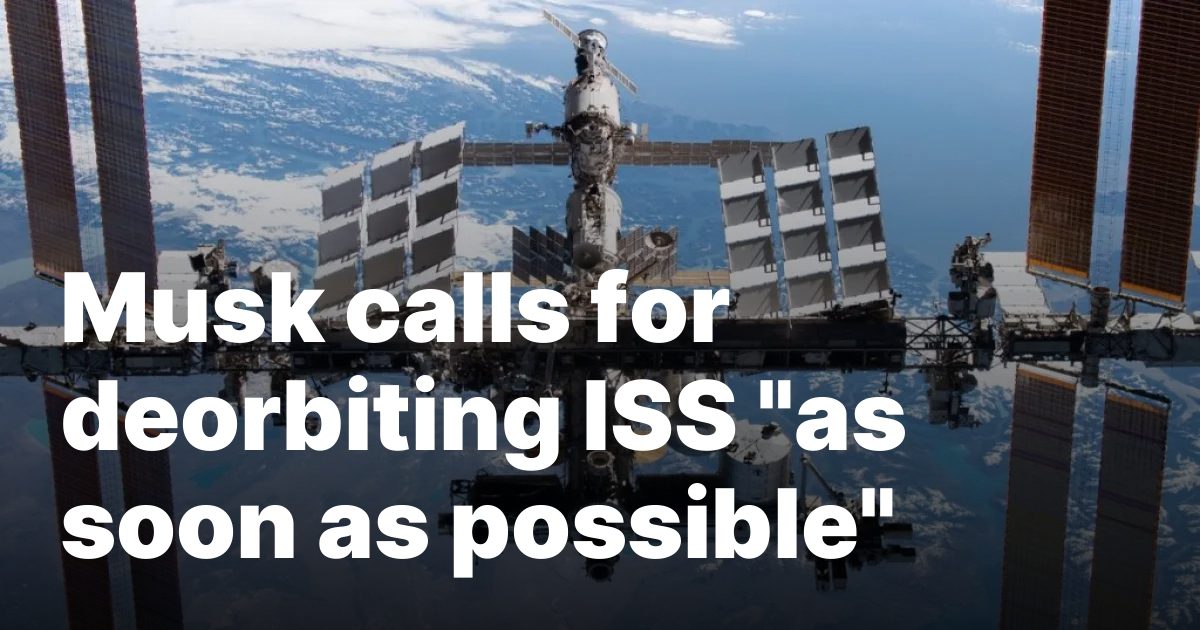
WASHINGTON — Elon Musk, the CEO of SpaceX, has made a bold statement suggesting that NASA should expedite the deorbiting of the International Space Station (ISS) within the next two years. Musk advocates for shifting focus toward Mars missions instead of prolonging the ISS’s existence.
This unexpected recommendation from Musk, shared via social media on February 20, raises questions about his relationship with the space agency and the broader space industry, particularly given his close ties with former President Donald Trump.
“It’s time to start planning for the deorbiting of the @Space_Station,” Musk declared on X, the platform he owns. “The ISS has fulfilled its purpose, and there’s limited additional utility from it. Let’s focus on Mars.”
When pressed for clarification regarding a potential ISS retirement before NASA’s established target of 2030, Musk reiterated his position, stating that it should occur within two years. “The final decision lies with the President, but I believe it should happen as soon as possible and recommend a timeline of two years from now,” he added in a subsequent post.
These remarks complicate NASA’s existing plans for the ISS, which include maintaining the station until 2030 while preparing for the launch of at least one commercial space station to continue essential research and technology development.
In pursuit of this goal, NASA awarded SpaceX an $843 million contract in June 2024 for the creation of the United States Deorbit Vehicle (USDV), derived from the Dragon spacecraft. This vehicle is intended to dock with the ISS and execute the final maneuvers needed for its safe deorbiting over a secluded region of the South Pacific, thereby minimizing risks to the public.
The USDV is expected to launch approximately one year prior to the deorbiting event. NASA has indicated its preference for the USDV to be ready for launch by August 2028, with a firm deadline of May 2029. However, it remains uncertain if the USDV’s development can be expedited to align with Musk’s aspiration for a 2027 deorbit.
Additionally, an early deorbit could strain relationships with various companies and organizations participating in the ISS and future commercial space stations, as well as with international partners committed to the ISS until 2030, apart from Russia, which has announced plans to remain involved until 2028.
A critical concern regarding a premature ISS deorbit is the potential gap it could create in the U.S. human presence in low Earth orbit (LEO). This is a key focus of NASA’s LEO Microgravity Strategy, released in December, which aims to maintain continuous human activity in orbit. NASA has also discussed overlapping operations between the ISS and commercial space stations to ensure a smooth transition for ongoing research and technology initiatives.
There are ongoing doubts within the industry about the readiness of any commercial station by 2030, which might compel NASA to either accept a hiatus or extend the operational timeline of the ISS. Despite this, station developers remain optimistic, with Vast detailing plans for a continually crewed station ready before 2030, while Axiom updated its station plans for potential crew support as early as 2028.
Notably, members of Congress have expressed a desire to maintain a continuous U.S. presence in LEO. At the Commercial Space Conference on February 12, Sen. Ted Cruz (R-Texas), chairman of the Senate Commerce Committee, stated, “Shifting focus away from LEO in a bid to prioritize lunar or Martian exploration could create a vacuum that China might exploit, distancing us from our allies.”
Cruz emphasized the importance of continuing ISS operations until its commercial successors are fully operational, highlighting that the U.S. has invested over $100 billion in the ISS, making it unwise to prematurely abandon that investment.
Rep. Brian Babin (R-Texas), chairman of the House Science Committee, echoed these sentiments at the conference, acknowledging the ISS as a remarkable technological achievement and stressing the need for careful planning to achieve U.S. objectives in LEO.
The motivation behind Musk’s call for an expedited end to the ISS remains unclear. SpaceX plays a vital role in the station’s operations, being the primary transportation provider for NASA astronauts and cargo.
Interestingly, Musk’s remarks followed shortly after he reacted to criticism from European Space Agency astronaut Andreas Mogensen, who traveled to the ISS on the Crew-7 mission. In a post on X, Mogensen condemned Musk for comments regarding NASA astronauts allegedly left on the ISS for political reasons, a claim lacking substantiation. Musk responded with strong language, asserting that SpaceX had offered to return those astronauts sooner, a claim for which he did not provide further details.
Just hours after addressing Mogensen, Musk reiterated his call for an earlier deorbit of the ISS.
Related









